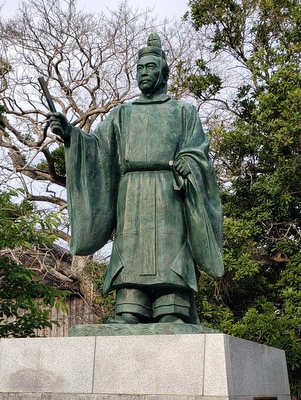Difference between revisions of "So Yoshitoshi"
m (→References) |
|||
| (5 intermediate revisions by the same user not shown) | |||
| Line 1: | Line 1: | ||
| + | [[File:So-yoshitoshi.jpg|right|thumb|400px|Statue of Sô Yoshitoshi in the former ''[[buke yashiki]]'' (samurai households) district of Tsushima Fuchû (Izuhara).]] | ||
| + | [[File:So-yoshitoshi-grave.jpg|right|thumb|400px|Grave of Sô Yoshitoshi at [[Banshoin|Banshô-in]] temple on Tsushima]] | ||
* ''Born: [[1568]]'' | * ''Born: [[1568]]'' | ||
* ''Died: [[1615]]'' | * ''Died: [[1615]]'' | ||
* ''Titles: Tsushima no kami'' | * ''Titles: Tsushima no kami'' | ||
* ''Distinction: Lord of [[Tsushima province|Tsushima]]'' | * ''Distinction: Lord of [[Tsushima province|Tsushima]]'' | ||
| + | * ''Other Names'': 万松院殿 ''(Banshô-in dono)'' | ||
* ''Japanese:'' 宗 義智 (''Sô Yoshitoshi'')<ref>One sometimes sees the name given as "Yoshitomo."</ref> | * ''Japanese:'' 宗 義智 (''Sô Yoshitoshi'')<ref>One sometimes sees the name given as "Yoshitomo."</ref> | ||
| − | Yoshitoshi was the son-in-law of [[Konishi Yukinaga]] and succeeded to the | + | Yoshitoshi was the 19th head of the [[So clan|Sô clan]] and the first [[Edo period]] lord of [[Tsushima han]]. The fourth son of [[So Masamori|Sô Masamori]], he was a son-in-law of [[Konishi Yukinaga]] and succeeded to become head of the Sô house in [[1588]]. Yoshitoshi served in the [[Korean Invasions]] under Yukinaga and later sided with [[Tokugawa Ieyasu]] during the [[Sekigahara Campaign]] ([[1600]]), though he took no part in the fighting at Sekigahara. |
| − | + | Yoshitoshi later worked to restore normal relations with Korea. He eventually succeeded, with an official [[Korean embassies to Edo|Korean embassy]] first arriving in [[1607]], and the [[Kiyu Treaty|Kiyû Treaty]] being concluded two years later. Following this, the [[Tokugawa shogunate]] affirmed the Sô clan's sole (monopoly) rights on Japanese diplomatic and trade relations with Korea.<ref name=statue>Explanatory plaque on Sô Yoshitoshi statue, Izuhara, Tsushima.</ref> | |
Upon his death in [[1615]], his son [[So Yoshinari|Sô Yoshinari]] became ''daimyô''. | Upon his death in [[1615]], his son [[So Yoshinari|Sô Yoshinari]] became ''daimyô''. | ||
| + | |||
| + | A statue of Yoshitoshi was erected on Tsushima in 2016, in connection with the 400th anniversary of his death, celebrating Yoshitoshi as a symbol of friendly relations between Japan and Korea.<ref name=statue/> | ||
| + | |||
| + | |||
| + | <br><br><br> | ||
| + | <center> | ||
| + | {| border="3" align="center" | ||
| + | |- align="center" | ||
| + | |width="32%"|Preceded by:<br>[[So Yoshishige (1532-1588)|Sô Yoshishige]] | ||
| + | |width="35%"|'''Head of the [[So clan|Sô clan]]'''<br> [[1588]]-[[1615]] | ||
| + | |width="32%"|Succeeded by:<br>'''[[So Yoshinari|Sô Yoshinari]]''' | ||
| + | |- align="center" | ||
| + | |width="32%"|Preceded by:<br>'''None''' | ||
| + | |width="35%"|'''Lord of [[Tsushima han]]'''<br> [[1603]]-[[1615]] | ||
| + | |width="32%"|Succeeded by:<br>'''[[So Yoshinari|Sô Yoshinari]]''' | ||
| + | |} | ||
| + | </center> | ||
==References== | ==References== | ||
Latest revision as of 21:35, 18 July 2022


- Born: 1568
- Died: 1615
- Titles: Tsushima no kami
- Distinction: Lord of Tsushima
- Other Names: 万松院殿 (Banshô-in dono)
- Japanese: 宗 義智 (Sô Yoshitoshi)[1]
Yoshitoshi was the 19th head of the Sô clan and the first Edo period lord of Tsushima han. The fourth son of Sô Masamori, he was a son-in-law of Konishi Yukinaga and succeeded to become head of the Sô house in 1588. Yoshitoshi served in the Korean Invasions under Yukinaga and later sided with Tokugawa Ieyasu during the Sekigahara Campaign (1600), though he took no part in the fighting at Sekigahara.
Yoshitoshi later worked to restore normal relations with Korea. He eventually succeeded, with an official Korean embassy first arriving in 1607, and the Kiyû Treaty being concluded two years later. Following this, the Tokugawa shogunate affirmed the Sô clan's sole (monopoly) rights on Japanese diplomatic and trade relations with Korea.[2]
Upon his death in 1615, his son Sô Yoshinari became daimyô.
A statue of Yoshitoshi was erected on Tsushima in 2016, in connection with the 400th anniversary of his death, celebrating Yoshitoshi as a symbol of friendly relations between Japan and Korea.[2]
| Preceded by: Sô Yoshishige |
Head of the Sô clan 1588-1615 |
Succeeded by: Sô Yoshinari |
| Preceded by: None |
Lord of Tsushima han 1603-1615 |
Succeeded by: Sô Yoshinari |
References
- Initial text from Sengoku Biographical Dictionary (Samurai-Archives.com) FWSeal & CEWest, 2005